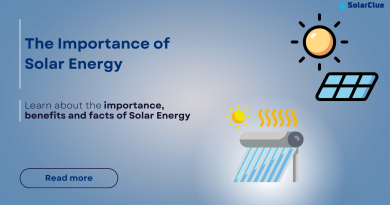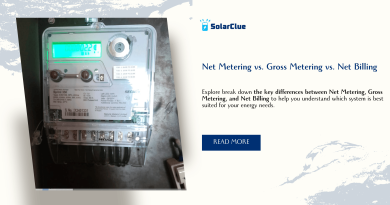Evaluating the Benefits of Solar Power Systems: Is It Right for You?
Table of Contents
- 1 Introduction
- 2 Section 1: Clean and Renewable Energy
- 3 Section 2: Cost Savings
- 4 Section 3: Energy Independence
- 5 Section 4: Government Incentives
- 6 Section 5: Increased Property Value
- 7 Section 6: Low Maintenance Requirements
- 8 Section 7: Technological Advancements
- 9 Section 8: Evaluating Your Energy Needs
- 10 Section 9: Consideration of Location and Climate
- 11 Section 10: Professional Consultation
Introduction
Benefits of Solar Power Systems are manifold. In this blog, we will explore and evaluate the advantages of solar power systems to help you determine if this eco-friendly energy solution is the right fit for your needs. The adoption of solar power systems has witnessed a significant surge as individuals and businesses seek sustainable and cost-effective alternatives.
Section 1: Clean and Renewable Energy
1.1 Harnessing the Power of the Sun
Solar power systems generate electricity by harnessing the abundant and renewable energy from the sun. This eco-friendly approach reduces reliance on conventional power sources, contributing to a cleaner and more sustainable energy future.
1.2 Lower Carbon Footprint
By utilizing solar energy, you actively participate in reducing your carbon footprint. Solar power systems produce electricity without emitting harmful pollutants, aligning with global efforts to combat climate change and environmental degradation.
Section 2: Cost Savings
2.1 Reduced Energy Bills
One of the most significant advantages of solar power systems is the potential for substantial cost savings on energy bills. By generating your electricity, you can significantly lower or eliminate your reliance on traditional grid power.
2.2 Return on Investment (ROI)
While there is an initial investment in installing solar panels, the long-term benefits often result in a positive return on investment. The savings from reduced energy bills and potential government incentives contribute to the overall financial appeal.
Section 3: Energy Independence
3.1 Reduced Reliance on the Grid
Solar power systems empower individuals and businesses with a degree of energy independence. By generating your electricity, you can reduce dependence on the traditional power grid, ensuring a more stable and resilient energy supply.
3.2 Grid Support and Flexibility
Solar power systems can contribute excess energy back to the grid, providing support during peak demand periods. This two-way interaction enhances the flexibility of the energy infrastructure and benefits both users and the grid.
Section 4: Government Incentives
4.1 Tax Credits and Rebates
Governments often incentivize the adoption of solar power through tax credits and rebates. These financial incentives can significantly offset the initial investment, making solar power systems more accessible and attractive.
4.2 Renewable Energy Certificates (RECs)
Investors in solar power systems may earn Renewable Energy Certificates (RECs), reflecting the environmental benefits of using renewable energy. These certificates can be traded or sold, offering additional financial incentives.
Section 5: Increased Property Value
5.1 Enhanced Resale Value
Homes and businesses equipped with solar power systems often experience an increase in property value. The long-term cost savings and environmental benefits associated with solar installations make such properties more attractive to potential buyers or tenants.
5.2 Competitive Edge in the Market
Solar-equipped properties have a competitive edge in the real estate market. The growing demand for sustainable features positions solar power systems as valuable assets, contributing to a property’s marketability.
Section 6: Low Maintenance Requirements
6.1 Minimal Operating Costs
Solar power systems have minimal operating costs once installed. Routine maintenance is generally straightforward, and the durability of solar panels ensures a low-risk, low-cost investment over time.
6.2 Long Lifespan
Solar panels are designed to withstand the elements and typically have a long lifespan. The durability of the system contributes to its low maintenance requirements, making it a hassle-free and reliable investment.
Section 7: Technological Advancements
7.1 Improved Efficiency
Ongoing technological advancements in solar panel technology lead to improved efficiency. Modern solar power systems can generate more power from the same amount of sunlight, enhancing overall energy production.
7.2 Smart Integration
Solar power systems now come equipped with smart technologies, allowing for real-time monitoring and optimization. These features enhance system performance, providing users with greater control and efficiency.
Section 8: Evaluating Your Energy Needs
8.1 Assessing Energy Consumption
Before deciding on a solar power system, evaluate your energy needs. Consider your current energy consumption patterns and whether solar energy can adequately meet your requirements.
8.2 Financial Considerations
Assess your budget and financial goals. While solar power systems offer long-term benefits, it’s essential to ensure that the initial investment aligns with your financial capacity and objectives.
Section 9: Consideration of Location and Climate
9.1 Solar Potential in Your Location
Evaluate the solar potential in your location. Consider factors such as sunlight exposure, shading, and local climate conditions to determine the effectiveness of solar power in your area.
9.2 Climate Resilience
Solar power systems are designed to withstand various weather conditions, but it’s crucial to consider the climate resilience of the system concerning the specific challenges in your region.
Section 10: Professional Consultation
10.1 Seeking Expert Advice
Consider consulting with solar energy professionals. An expert assessment of your property, energy needs, and financial considerations can provide valuable insights into whether a solar power system is the right fit for you.
10.2 Exploring Customized Solutions
Solar energy professionals can offer customized solutions based on your unique circumstances. From system size to financing options, professional advice can help tailor a solar


